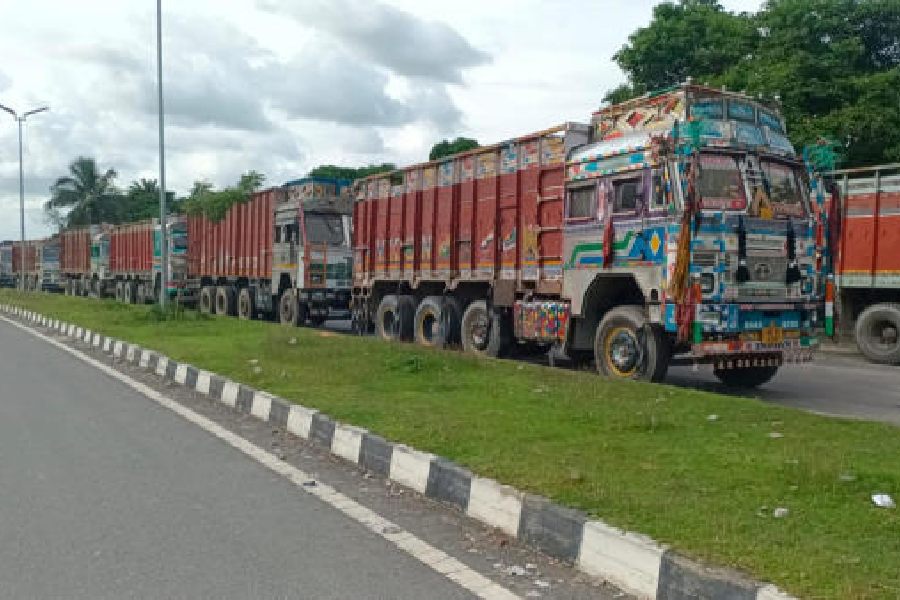Bilateral trade between India and Bangladesh suffered seriously because of the growing unrest in the neighbouring country as the export of goods through Petrapole and three other land ports in Bengal had to be suspended for an indefinite period from Saturday morning.
The export was halted after authorities in Bangladesh failed to accept the “bill of entry” of cargo vehicles because of the disruption in the Internet.
Apart from Petrapole — which is the largest land port in Asia, normal trade activities have been suspended at Ghojadanga in North 24-Parganas, Changrabandha in Cooch Behar and Fulbari in Jalpaiguri. However, land ports at Mahadipur in Malda and Hili in South Dinajpur remained operational.
At Petrapole, normal trade activities on Saturday had begun with around 40 cargoes crossing the border. However, the Indian exporters had to stop sending their cargo after the Bangladesh authorities informed them about the inability to issue entry dockets to vehicles on the designated portal because of the absence of Internet service.
However, later in the day, highly perishable items like vegetables and fish were “manually” exported with “special permission” from the Bangladesh authorities.
Around 24 such cargoes were exported through Petrapole and 130 entered Bhomra port in Bangladesh through the Ghojadanga port.
“This a helpless situation for us. We came to know that the Benapole land port authorities in Bangladesh could not issue entry dockets to our vehicles because of the absence of the Internet. We sought advice from the Land Ports Authority of India (LPAI) at Petrapole. But since no way could be found to overcome the problem because of a situation beyond their control, we eventually suspended export activities,” Kartick Chakraborty, secretary of the Petrapole Clearing Agents Staff Welfare Association.
However, there was no suspension in the import of goods on Saturday even though the volume was low compared to any other working day.
Speaking to The Telegraph, Kamalesh Saini, the manager of LPAI-Petrapole, said: “There was no suspension of export officially from our end. However, export activities had to be stopped a little after morning since drivers appeared to be unwilling to go and the exporters also seemed to be hesitant. Eventually, export activities suffered.”
Exporters in north Bengal expressed concern over the indefinite detention of their vehicles carrying dolomites and boulders. Through Fulbari, around 350 trucks — 50 from India and 300 from Bhutan — laden with boulders enter Bangladesh every day. On the other hand, around 300 trucks move between Changrabandha and Burimari a day, carrying dolomite and other items.
Amarjit Roy, joint secretary of the Changrabandha Exporters Association, said: “Primarily, dolomite is sent to Bangladesh through Changrabandha. If the trade stops, we have to pay ₹1,500 to ₹2,000 per day towards the detention charge. Every day, goods worth around ₹2.5 crore are sent through Changrabandha. As of now, around 200 trucks are stranded in Changrabandha and we don’t know when the situation will be normal.”
Students from Bangladesh also continued to return to India through different check-posts in Bengal on Saturday.
The ministry of external affairs on Saturday stated the safe return of 778 students from the neighbouring country.
The MEA collaborated with the civil aviation ministry and the MHA to ensure smooth passage for students and other Indian nationals from Bangladesh. At least 4,000 Indians are still stranded in Bangladesh and they are in touch with the Indian High Commission.
In Bengal, many students — who belong to India and neighbouring countries like Nepal and Bhutan — were seen returning from Bangladesh through different check-posts adjacent to the Bangladesh border.
Around 13 students of Mymensingh Medical College, including one Indian, entered Bengal through the Changrabandha on Saturday.
Mustafijur Rahaman, one of such MBBS students from Nalbari of Assam, said: “We started around 9pm yesterday. We reached Changrabandha this morning. During the trip, we didn’t face any inconvenience but the roads were almost deserted.”











